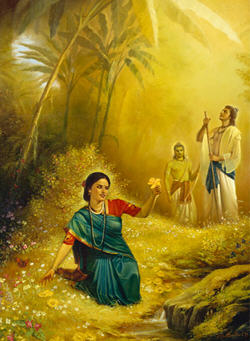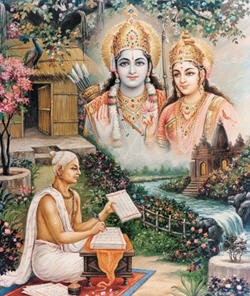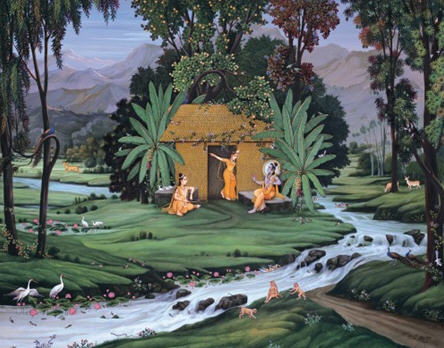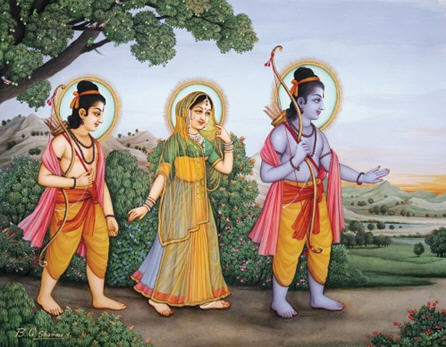
Having Lived in Chitrakut for some time, one day Lord Ramacandra began to point out the beauty of Chitrakut to Sita Devi:
“O Fortunate Princess, when I behold this ravishing mountain, neither the loss of the kingdom nor the absence of My friends distresses Me. O Fortunate One, behold that mountain abounding with flocks of birds of every kind, where the metals lie, crowned with peaks that seem to kiss the skies. See how amongst the summits some have the radiance of silver, others of gold; some are the colour of madder [a reddish dye], some yellow, and some sparkle like precious stones or resemble flowers or crystals or ketaka trees; they shimmer like quicksilver; those regions contain many metals; the mountains is full of herds of tame deer, tigers, panthers, and bears and is enlivened by flocks of birds. The serried ranks of mango, jambu, asana, … and many other trees, covered with flowers and laden with fruit, affording magnificent shade, make this mountain an enchanting retreat.… See how, from the crevices, the waters fall in cascades from every side, causing the mountain to resemble an elephant with the ichor flowing from its forehead. Who would not be filled with delight by these glades from which the fragrance of many flowers issues, pleasing to the senses? O Peerless One, if I am to live with thee and Laksmana for many autumns here, no grief will visit Me. This mountain, laden with flowers and fruit, the enchanting resort of flocks of birds, with its ravishing peaks, captivates Me, O Lovely One.”
Valmiki speaks of Chitrakuta as an eminently holy place inhabited by the great sages, abounding in monkeys, bears and various other kinds of fauna and flora. Both the sages Bharadwaja and Valmiki speak of Chitrakuta in glowing terms and advise Rama to make it his abode during the period of his exile. Lord Rama himself admits this bewitching impact of this place. In the 'Ramopakhyana' and descriptions of teerthas at various places in the Mahabharata, Chitrakuta finds a favoured place. 'Adhyatma Ramayana' and 'Brihat Ramayana' testify to the throbbing spiritually and natural beauty of Chitrakuta. Various Sanskrit and Hindi poets also have paid similar tributes to Chitrakuta. MahakaviKalidas has described this place beautifully in his epic 'Raghuvansha'. He was so much impressed with its charms that he made Chitrakuta (which he calls Ramgiri because of its time-honoured associations with Lord Rama) the place of exile of yaksha in Meghdoot.
Chitrakoot,"the hills of many wonders" is indeed a gift of nature and the gods. Located in the Banda district of modern Uttar Pradesh(U.P), on the banks of river Paisuni(Mandikini),Chitrakoot is a tranquil retreat on the northern spur of the Vindhyas. Just 6 km south of Karvi and 72 km south east of Banda district on the road to Allahabad, ChitrakootDham is one of the most ancient holy pilgrim places of India. Legends have it that it was the abode of Lord Rama, his wife Sita and brother Lakshman for eleven years of their fourteen years of exile. This is also the place,where they came in contact with sage Atri and sati Anasuya.This abode of the gods is credited to have seen the incarnations of Brahma,Vishnu and Mahesh. Chitrakoot ,sacred with the touch of Lord's feet,was where GoswamiTulsidas, the creator of the epic "ShriRamcharitmanas" spent many years of his life.

Tulsidas, the saint-poet of Hindi has spoken very reverently of this place in all his major works-RamcharitManas, Kavitawali, Dohawali and VinayaPatrika. The last-mentioned work contains many verses which show a deep personal bond between Tulsidas and Chitrakuta. He spent quite some part of his life here worshipping Rama and craving his darshan. It was here that he had what he must have considered the crowning moment of his achievements i.e. the darshan of his beloved deity Lord Ram at the intercession of Hanumanji.
Though exiled from His kingdom, Lord Rämacandra lived happily in this beautiful holy place.
Lord Ramachandra Lived for twelve years in the Chitrakut forest with His wife, Sitä Devi, and His brother Laksmana. The story of how they came here and what they did is recounted in the Rämäyana.
Räma was exiled to the forest for fourteen years. When He first entered the forest with Laksmana and Sitä, He asked Bharadväja Muni where they should stay. The Muni advised them to go to Chitrakut, about ten miles from his äshrama.
The Rishis in Chitrakut had been praying that Räma would come there. They had been thinking, “The world is full of disturbances, especially from the Räkshasas (demons). If Räma stays in Ayodhyä, how will He fulfill His mission of killing all the demons?”
When Räma came to Chitrakut, Räkshasas were spoiling the peaceful atmosphere of the place by attacking the Rishis. So He killed many Räkshasas during His stay there.
There are quite a few äshramas in Chitrakut, although not as many as temples. In two äshramas, chanting the names of Lord Räma goes on nonstop day and night. In one of the äshramas this has been going on for more than twenty-five years, and in the other, more than forty years.
At one of the Jänaki-kunda’s, there’s an äshrama where about ten sädhus live, and twice a day they feed all the visitors who come there. On the average a day, they feed about twenty-five sädhus and forty other pilgrims. While taking prasädam, the guests hear the pastimes of Lord Räma, as a reading goes on twenty-four hours a day.
Local devotees say that “Those who are pure can see Räma even today here in Chitrakut,” .“Räma walking, Räma bathing, Räma stooping down to drink from the river … Yes. Those who are pure can still see Räma at Chitrakut.”
Now Lord Rama decided for two reasons to leave Chitrakuta: first, inasmuch as hosts of rakshasas, out of hatred of him, annoyed the hermits of that place; and, secondly, because the host of men from Ayodhya had tampled and defiled the place; and, moreover, it reminded Him too sharply of brother's grief and the citizens' and queen-mothers'. He went, therefore, with Sita and Lakshmana toward Dandaka forest.

